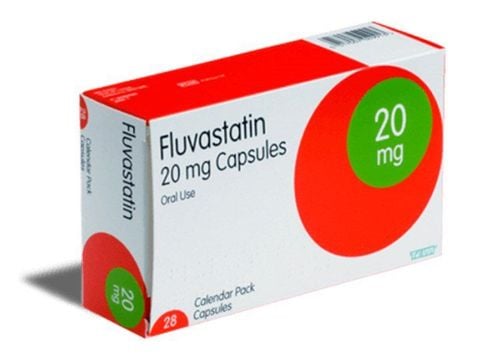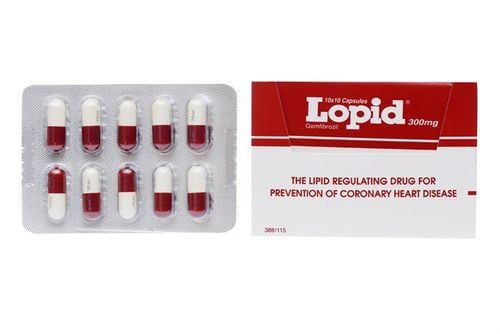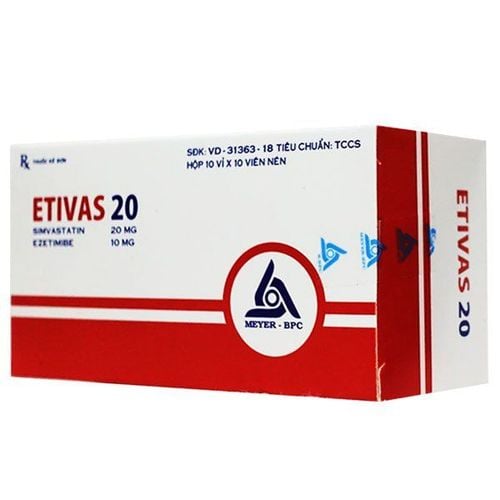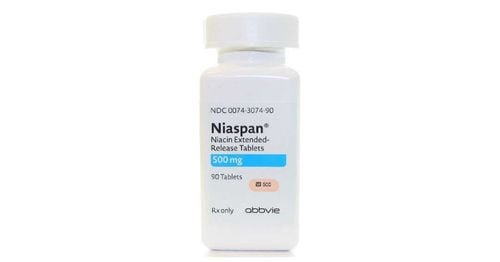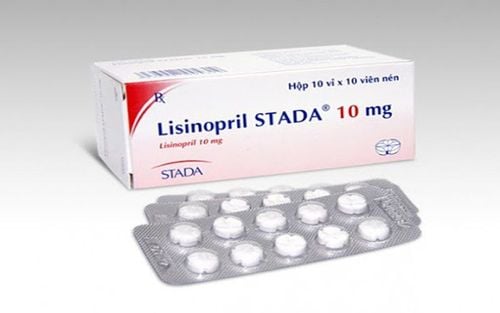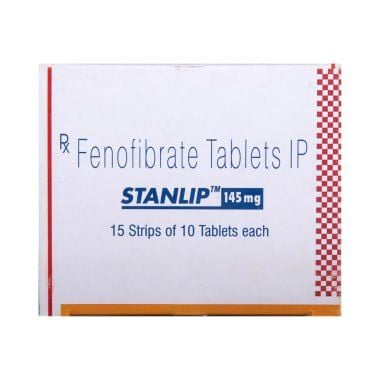This is an automatically translated article.
Fenofibrate is used with a proper diet to help lower "bad" cholesterol and fats (such as LDL, triglycerides) and increase "good" cholesterol (HDL) in the blood. The drug works by increasing the enzyme that breaks down fats in the blood.1. What does Fenofibrate do?
Fenofibrate belongs to the group of drugs called "fibrates". The drug works to lower triglycerides in people with very high blood triglyceride levels, which may reduce the risk of pancreatic disease (pancreatitis). However, fenofibrate may not reduce the risk of heart attack or stroke.In addition to eating an appropriate diet (such as a low-cholesterol/low-fat diet), other lifestyle changes that may help fenofibrate work better include exercise, weight reduction, and exercise. weigh yourself if you are overweight, and stop smoking.
Fenofibrate is indicated in the following cases:
High cholesterol High blood cholesterol heterozygous inheritance High levels of triglycerides in the blood High cholesterol and high triglycerides Too much fat in the blood Low HDL cholesterol Fenofibrate is contraindicated in the following cases:
Anemia Low blood platelet count Very low white blood cell count Myopathy Blood clot blockage Liver disease Gallbladder disease Acute pancreatitis Myopathy Myositis Abnormal liver function Lactating women Primary cholangitis Chronic kidney disease stage 2, stage 3A, stage 3B, stage 4, stage 5.
2. How to use Fenofibrate
Fenofibrate is taken by mouth as directed by your doctor, usually once daily. Fenofibrate comes in different capsule and tablet forms that provide different amounts of the drug. Do not switch between different forms or brands of this medication unless directed by your doctor. Some forms of Fenofibrate should be taken with food, but others can be taken with or without food. Ask your doctor about your brand of fenofibrate. It is important to take Fenofibrate correctly for it to get the most benefit. The dose of Fenofibrate is calculated based on your medical condition and response to treatment. If you are also taking certain other medicines to lower cholesterol (bile acid-binding drugs such as cholestyramine or colestipol), take fenofibrate at least 1 hour before or at least 4 to 6 hours after taking these medicines. These drugs can bind to fenofibrate, preventing your body from absorbing the medicine completely. Take Fenofibrate regularly to get the most benefit from it. To help you remember and avoid forgetting to take your medicine, take it at the same time each day. Do not increase your dose or use fenofibrate more often or use it for longer than directed by your doctor. Your cholesterol/triglyceride levels will not drop any faster when you do, but the risk of side effects will increase. Keep taking fenofibrate even if you feel well. Most people with high cholesterol or triglycerides do not feel sick. It is important that you continue to follow your doctor's advice about diet and exercise after taking this medicine. It may take up to 2 months before you get the full benefits of fenofibrate. Tests such as cholesterol/triglyceride levels, kidney/liver function tests, and complete blood count should be performed periodically to monitor your progress or check for side effects from fenofibrate.
Kể cả khi bạn đã thấy khỏe, hãy tiếp tục sử dụng hết liều thuốc Fenofibrate
3. Side effects of the drug Fenofibrate
Remember that your doctor has prescribed Fenofibrate because he or she has judged that the benefit to you outweighs the risk of side effects. Many people use fenofibrate without any serious side effects.Fenofibrate rarely causes gallstones and liver problems. But if you notice any of the following unlikely but serious side effects, tell your doctor right away: Persistent nausea/vomiting, loss of appetite, stomach/abdominal pain, yellowing eyes or jaundice, dark urine.
Fenofibrate rarely causes muscle problems, which can rarely lead to a very serious condition called rhabdomyolysis. Tell your doctor right away if you have any of the following symptoms: Fatigue muscle pain especially fever or unusual tiredness, signs of kidney problems.
Rarely, Fenofibrate reduces HDL (good cholesterol). This is the opposite of what would happen to your HDL levels (paradoxical response). Your HDL cholesterol level should be checked regularly.
Tell your doctor right away if you have any serious side effects of Fenofibrate, including: Easy bleeding/bruising, unusual tiredness.
Get medical help right away if you have any very serious side effects of Fenofibrate, including: Chest pain, sudden pain/redness/unusual swelling in your legs, signs of infection (such as such as sore throat that doesn't go away, fever, swollen lymph nodes, chills, cough).
A very serious allergic reaction to Fenofibrate is very rare. However, if you notice any symptoms of a serious allergic reaction to fenofibrate, get medical help right away. These include: Rash, itching/swelling (especially of the face/tongue/throat), difficulty breathing, severe dizziness.
Below are Fenofibrate side effects by likelihood.
Common side effects of Fenofibrate include:
Abnormal liver function Nasal congestion and runny nose Uncommon side effects of Fenofibrate include:
Infection Thrombophlebitis due to blood clot Itching Leech nest Muscle pain Skin rash Changes in sexual preferences Myopathy Eye irritation Sore throats Colds Constipation Increased skin sensitivity to sunlight Back pain Dizziness Flu-like symptoms Headache Nausea Stomach bloating Ợ slight weakness Severe abdominal pain Rare side effects of Fenofibrate include:
Thrombocytopenia in the blood Very low granulocytopenia A blood clot in the lungs Blood clots in the veins Pneumonia allergies Lung tissue problems DRESS syndrome Anemia Indigestion Joint pain Muscle spasms Difficulty sleeping Cough Diarrhea Cholesterol Low HDL This is not a complete list of the possible side effects of Fenofibrate. If you notice other effects of Fenofibrate medicine not listed above, contact your doctor for timely treatment.

Nghẹt mũi là tác dụng phụ thường gặp của thuốc Fenofibrate
4. Measures to prevent side effects of the drug Fenofibrate
Before taking fenofibrate, tell your doctor if you are allergic to this medicine; or to other "fibrates" (such as fenofibric acid) and any other allergies if present. Fenofibrate may contain inactive ingredients (such as soy), and they may cause allergic reactions or other problems.Before using Fenofibrate, tell your doctor your medical history, especially of: Kidney disease, gallbladder disease, liver disease (such as cholangitis, hepatitis), alcohol use.
Before surgery, tell your doctor or dentist that you are using Fenofibrate.
For women during pregnancy, Fenofibrate should be used only when clearly needed. Discuss the risks and benefits of Fenofibrate with your doctor.
Currently, it is not known whether Fenofibrate passes into breast milk. Because of the possible risk to the infant, experts do not recommend breast-feeding while using fenofibrate and for 5 days after stopping it.
5. Fenofibrate drug interactions
Drug interactions can change the way fenofibrate works or increase your risk of serious side effects. Make a list of all the medications you take (including prescription/nonprescription drugs and herbal products) and share it with your doctor. Do not start, stop, or change the dose of any medicine while using Fenofibrate, without your doctor's approval.Some drugs that can interact with Fenofibrate include: Anticoagulants (such as warfarin).
Fenofibrate is very similar to fenofibric acid. Therefore, do not use medicines containing fenofibric acid while taking fenofibrate.
6. What to do when overdose or forget to use Fenofibrate?
If you or someone else has overdosed on Fenofibrate and has severe symptoms such as fainting or difficulty breathing, call 911 right away.If you miss a dose of Fenofibrate, take it as soon as you remember. If it is almost time for your next dose, skip the missed dose. Take your next dose of Fenofibrate at the usual time, do not double the usual dose.
7. How to store Fenofibrate
Store Fenofibrate at room temperature, away from light and moisture. Different brands of Fenofibrate have different storage requirements. Check the product package for instructions on how to store the brand of medicine you use, or ask your pharmacist. Do not store Fenofibrate in the bathroom, keep it away from children and pets.Do not flush Fenofibrate down the toilet or down the drain unless instructed to do so. Dispose of this medication appropriately when it has expired or is no longer needed.
Please dial HOTLINE for more information or register for an appointment HERE. Download MyVinmec app to make appointments faster and to manage your bookings easily.
Reference source: webmd.com



